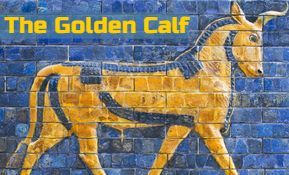
Bereishit: Let Us Make Man
God modeled the essence of humility by demonstrating that self worth does not depend on what others think of you.

A Pretext for Error
The climax of the six days of Creation was the formation of man.
“And God said, ‘Let us make man in Our image, after Our likeness” (Bereishit 1:26).
Targum Yonatan paraphrases: “And God said to the ministering angels who had been created on the second day of Creation of the world, ‘Let us make man.’”
When Moshe wrote the Torah and came to this verse (“Let us make man. . .”), which is in the plural and implies that there is more than one Creator, he said: “Sovereign of the Universe! Why do You thus furnish a pretext for heretics to maintain that there is a plurality of divinities?”
“Write!” God replied. “Whoever wishes to err – let him err… Instead, let them learn from their Creator Who created all, and yet when He came to create man He took counsel with the ministering angels” (Midrash Rabbah 8:9).
Thus God taught that one should always consult others before embarking upon any major new initiatives, and He was not deterred by the possibility that some might choose to find a sacrilegious implication in the verse.
A question remains, though. If God wanted to instruct us to always consult others, couldn’t He have simply commanded us to do so? Granted, He taught a powerful lesson in derech eretz, proper conduct. It was, however, at the expense of heretics who actually used this verse as a pretense to justify their non-monotheistic views. Why did He furnish a pretext for error to teach the lesson of derech eretz?
Some answer that the implication of God’s response, “Whoever wishes to err,” is that one who sincerely seeks the truth will see it; one who looks for an excuse to blaspheme will find it (ArtScroll Chumash). While this is certainly true, it cannot be the whole picture. Wouldn’t our loving Father in Heaven have compassion on all his creatures? Why did He deliberately write this verse in the plural and provide the pretext for error?
Furthermore, this is the first mention of God’s creation of man, the pinnacle of Creation. It seems incongruous that this seemingly minor point of derech eretz dominates the structure of the verse. What is so important about consulting others?
The Most Important Trait
Let's look at Rashi’s commentary:
“Let us make man” – “From here we learn the humility of the Holy One, blessed be He. Since man was created in the likeness of the angels, and they would envy him, He consulted them.
“Even though they [the angels] did not assist Him in His creation, and there is an opportunity for the heretics to rebel (to misconstrue the plural as a basis for their heresies), Scripture did not hesitate to teach proper conduct and the trait of humility, that a great person should consult with and receive permission from a smaller one.
“Had it been written: ‘I shall make man,’ we would not have learned that He was speaking with His tribunal, but to Himself. And the refutation to the heretics is written alongside it [i.e., in the following verse:] ‘And God created,’ and it does not say, ‘and they created’” (Rashi, Bereishit 1:26).
Rashi emphasizes that humility is needed in order for the great person to consult with the smaller one. The lesson here is not just one of derech eretz; but more so the Torah is teaching us about the importance of humility! It is being taught at the point where the Torah speaks of mankind’s creation in order to stress that the basic foundation of a human being’s character development is humility.
But still, God could have provided a direct command. He could have told us to be humble!
Self Worth
Rabbi Eliyahu Dessler once visited a small town during a fund-raising trip for the Gateshead Yeshivah. On Friday night, the synagogue president asked him who he was, and he responded, “I serve my congregation.” The president assumed that Rabbi Dessler was the synagogue’s sexton. So when he asked permission to make an appeal that Friday night, he was told, “Only Rabbis may speak in our synagogue.”
Rabbi Dessler decided at that moment to continue the ‘masquerade’ as a simple janitor. “I decided then and there to personally donate the twenty or thirty pounds I could have raised for the Yeshivah had I corrected the mistake,” Rabbi Dessler related to his disciples. “I spent the entire Shabbat in the cloak of anonymity. No one stood up when I walked into a room, and no one addressed me as ‘his honor, the Rav.’ It was a powerful lesson in humility!” (Heard from Rabbi Mordechai Miller).
This incident reveals the true meaning of humility. Many people think a humble person is meek and timid, afraid to speak up or assert his authority. Yet the humblest man to ever exist was Moshe, who had the courage to stand up to Pharaoh when everyone else slipped away! He chastised the entire Children of Israel, 600,000 strong, and ground the Golden Calf into dust before their eyes. Even more so, Moshe himself wrote in the Torah: “Now the man Moshe was exceedingly humble, more than any person on the face of the earth!” (Bamidbar 12:3).
A truly humble person is aware of his talents and the abilities, but views them as nothing more than a gift from the One Above.
Humility is valuing ourselves for who we are, not because of what others think of us. That is what Rabbi Dessler enjoyed. For an entire Shabbat he was able to focus on his self worth unencumbered by the admiration of anyone who knew he was famous.
“Whoever wishes to err – let him err.” God was willing to let the world think that He needed a partner or assistants in creating mankind. Whatever the world thinks had no effect on His essence. And the only way to impart that lesson was by serving as an example. God modeled the essence of humility by demonstrating that self worth does not depend on what others think of you.
As we begin the new cycle of the weekly Torah portions, let’s take this message to heart and work on building a positive personal assessment of ourselves. The Creator is perfect and unaffected by the adoration of mankind or the lack of it. Let’s emulate our Creator and focus on our self worth, our God given talents and abilities, the intrinsic spark of holiness in our soul. In this way we can utilize our gifts and apply them to the lifetime endeavor of developing our character, whose foundation lies in the trait of humility.











